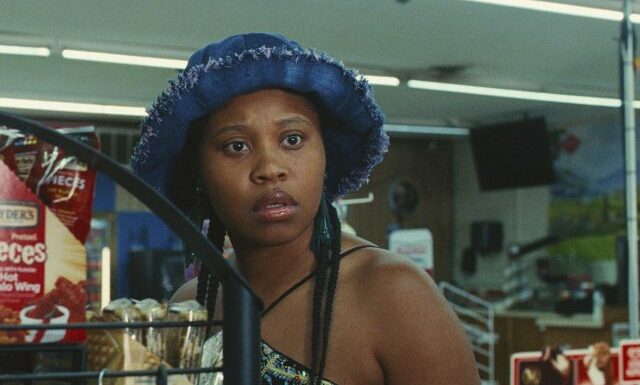
The following contains spoilers from the full season of Swarm (now streaming on Prime Video).
Rabid fandom takes a deadly turn in Prime Video’s wildly entertaining satirical horror series Swarm.
Dominique Fishback (Judas and the Black Messiah) stars as Dre, an obsessive fan of the fictional pop star Ni’Jah (played by Nirine S. Brown), who knows the words to every song and is willing to put herself into credit card debt for a concert. Following the death of her sister Marissa (Chlöe Bailey), Dre embarks on a cross-country journey to hunt down anyone who dares to speak ill of her beloved pop idol.
For Janine Nabers (Atlanta, Dietland), who co-created the show with Donald Glover, Swarm was an opportunity to tell a unique story.
“It was really interesting to just tell a story from a Black woman’s perspective,” Nabers tells TVLine. “I think this psychological space is reserved for white men mostly, especially in film and TV.”

In the season finale, Dre’s feverish reverence for Ni’jah culminates in her leaping on stage at a concert and almost being escorted out before Ni’jah intervenes. The sequence plays similarly to Dre’s hallucination in an earlier episode in which she bites Ni’jah at an afterparty —a clear nod to the infamous Beyoncè biting incident. The show gives Dre an ambiguous ending, with the serial murderer leaving the arena with Ni’jah in what feels like a fantasy sequence. It’s unclear what ultimately happens to Dre in that moment, and Nabers notes that the ending is up for interpretation.
“I think people have different viewpoints on Dre,” she says of the finale’s final moment. “Whatever viewpoint you have with her at that moment is right. It’s all about her mindset and your interpretation of this character.”

As for leaving things open-ended, the Swarm co-creator says she and Glover did so intentionally.
“When you look at the ending of Atlanta for Season 4, that ending was also a little ambiguous,” she concludes. “I think we lean towards that gray area. [In] a lot of Criterion movies, which inspired the aesthetic of the show, there is that open-endedness to it. I think some of the best films have this kind of open-endedness to it and so, we were really just interested in that that feeling of, ‘What does this mean? How do I feel?’ — and inspiring conversation around it.”
Source: Read Full Article

